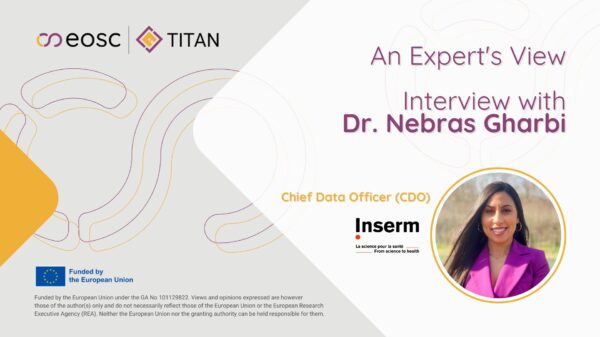Discover the vision guiding data strategy for Europe’s leading biomedical research institution in our interview with Dr. Nebras Gharbi, Chief Data Officer at Inserm. Dr. Nebras Gharbi offers a compelling perspective on navigating data governance, fostering international collaboration within EOSC and EHDS, and accelerating health innovation through secure data sharing.

Could you share your journey to becoming the Chief Data Officer at INSERM? What key aspects of data strategy, management, and governance have been central to your role?
My path to becoming Inserm’s Chief Data Officer has been guided by a genuine passion for biomedical science and the transformative power of data. Over the years, I’ve had the privilege to work in roles that bridged research, data management, and institutional strategy. These experiences gave me a well-rounded perspective on both the challenges and the immense opportunities that data presents in biomedical research.
At the heart of my role are three main priorities:
- Shaping a robust data strategy that aligns with international standards and the FAIR principles (Findable, Accessible, Interoperable, Reusable).
- Ensuring strong data governance to protect sensitive health information, uphold ethical standards, and maintain compliance.
- Encouraging a culture of data sharing and reuse to empower researchers and maximize the impact of our collective work.
From your perspective as CDO, what are Inserm’s overarching priorities in leveraging data to advance biomedical research, both nationally and internationally?
At Inserm, we see data as a vital asset for advancing science and improving health outcomes. Our priorities are to:
- Accelerate scientific discovery by enabling secure and meaningful integration of large-scale datasets.
- Foster reproducibility and transparency in research, which are essential for scientific credibility.
- Support innovation by providing researchers with access to diverse, high-quality datasets that fuel both national and international collaborations.
Could you elaborate on Inserm’s priorities for international collaborations, and specifically, how does Inserm actively support and promote European research projects like TITAN?
International collaboration is truly at the core of Inserm’s mission. Among other European initiatives, Inserm has been a member of the European Science Open Cloud (ESOC) association for several years. This involvement has allowed us to engage closely with the European research community and contribute to the development of shared data infrastructures and standards. Over the years, Inserm has also been actively involved in several EOSC projects such as EOSC Life, EOSC Pillar, and EOSC Siesta. These experiences have given us valuable opportunities to collaborate with partners across Europe, share expertise, and help shape the future of open science together. With the emergence of the European Health Data Space (EHDS), our collaborative efforts at the European level are taking on even greater significance. EHDS offers a unique opportunity to harmonize health data governance and sharing, making cross-border research more secure and efficient.
In this context, Inserm:
- Contributes to building interoperable infrastructures that support projects like TITAN and the broader EOSC ecosystem.
- Aligns its data management practices with European standards to ensure seamless collaboration.
- Facilitates the exchange of expertise and best practices among European partners, helping to amplify the impact of collective research efforts.
By leveraging our ESOC membership and working hand-in-hand with our partners, Inserm is committed to supporting and promoting European research projects and strengthening the integration of the European research landscape.
Considering your expertise and Inserm’s commitment to the European Open Science Cloud, what key challenges and opportunities do you see in establishing robust and trustworthy infrastructures for sharing sensitive health data across Europe to accelerate research?
Building trustworthy infrastructures for sharing sensitive health data across Europe is both a challenge and an opportunity. Protecting privacy and ensuring security are absolutely essential, especially given the sensitive nature of health data and the diversity of regulatory frameworks across countries. Achieving true technical and semantic interoperability also requires ongoing collaboration and the adoption of common standards.
Equally important is building trust among all stakeholders—patients, researchers, and institutions—so that everyone feels confident in how data is managed and shared.
On the positive side, initiatives like the European Open Science Cloud, and more broadly the European Health Data Space, offer us a chance to co-create a trusted environment for secure and ethical data sharing. This can accelerate scientific discovery, enable ambitious collaborative research, and reinforce Europe’s leadership in biomedical innovation. At Inserm, we are dedicated to upholding the highest standards for data protection, interoperability, and transparency in all our partnerships.
Looking ahead, what are your aspirations for Inserm’s role in shaping the future of collaborative data-driven biomedical research within Europe and on a global scale?
Looking to the future, my aspiration is for Inserm to continue to be a leading force in biomedical data science in Europe. Our unique position as the largest academic biomedical research institution in Europe—and as France’s only public-sector research body dedicated exclusively to human health—gives us both a responsibility and a wonderful opportunity to set standards and drive innovation.
Our goals are to:
- Sustain and expand our leadership in coordinating large-scale, collaborative European research projects, ensuring our infrastructures, data governance, and scientific output remain exemplary.
- Promote open, responsible, and interoperable data sharing practices, supporting initiatives like the European Open Science Cloud and the European Health Data Space to facilitate secure cross-border research.
- Strengthen partnerships with both academic and private sector stakeholders, fostering innovation and translating research findings into real-world health benefits.
- Actively contribute to shaping European and international research agendas, sharing our expertise to help develop new standards, infrastructures, and collaborative frameworks.
By pursuing these objectives, I believe Inserm will continue to play a pivotal role in advancing biomedical data science and collaborative research, both within Europe and worldwide.
👉 Follow TITAN today and be up to date with all the project’s developments.
👉 Join TITAN’s community on X (@titan_eosc) & on LinkedIn (@titan-eosc)